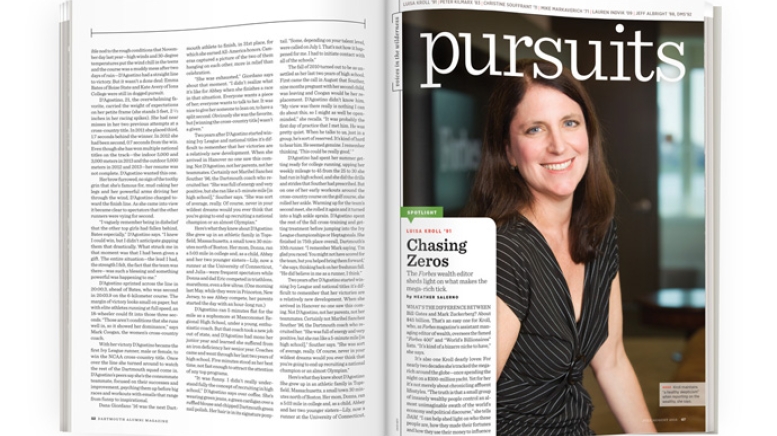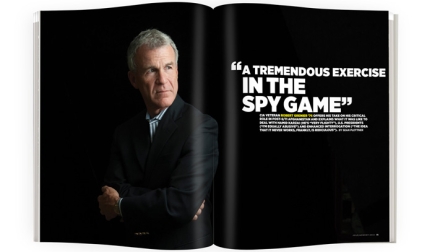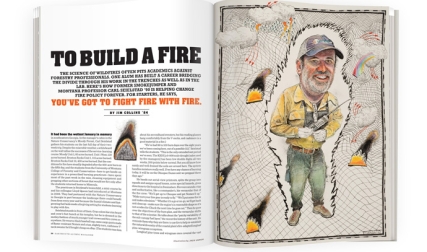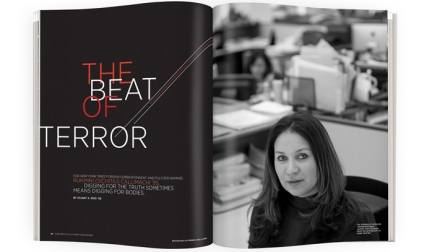Luisa Kroll ’91
Chasing Zeros
The Forbes wealth editor sheds light on what makes the mega-rich tick.
What’s the difference between Bill Gates and Mark Zuckerberg? About $45 billion. That’s an easy one for Kroll, who, as Forbes magazine’s assistant managing editor of wealth, oversees the famed “Forbes 400” and “World’s Billionaires” lists. “It’s kind of a bizarre niche to have,” she says.
It’s also one Kroll dearly loves: For nearly two decades she’s tracked the mega-rich around the globe—once spending the night on a $300-million yacht. Yet for her it’s not merely about chronicling affluent lifestyles. “The truth is that a small group of insanely wealthy people control an almost unimaginable swath of the world’s economy and political discourse,” she tells DAM. “I can help shed light on who these people are, how they made their fortunes and how they use their money to influence society, for both good and bad.”
Indeed, Kroll gets most excited telling rags-to-riches tales. One of her most memorable is about Luxottica’s Leonardo Del Vecchio, who grew up in an Italian orphanage and lost part of a finger in a factory. “I love how some come from so little,” she says.
Kroll also appreciates a good comeback. She recently returned from a trip to Iceland, where she trailed that nation’s first billionaire, Thor Bjorgolfsson. He regained his 10-figure fortune after nearly losing it all in the 2008 financial crisis, during which he was criticized for helping to bring about Iceland’s economic collapse. “His story is worthy of his country’s famous sagas, filled with history, drama, intense rivalries and all sorts of accusations of wrongdoing,” she says.
Through the years Kroll has been amazed by how many tycoons care deeply about where they’re ranked by Forbes. “These are tremendously ambitious, successful people,” she says. “To them, this is just one more measure of how they’ve succeeded.” She sometimes finds herself lobbied by the planet’s most prosperous. She recalls how one billionaire flew his company’s chief financial officer to New York City, instructing him not to leave until she assigned him a higher net worth. “I finally convinced the guy to go home,” she says. “We didn’t end up changing it.”
Kroll notes that these lists are massive reporting efforts, with dozens of staffers diving into piles of records to reach the most accurate assessments. To get at the truth she has no problem asking a magnate to put his money where his mouth is. When one insisted that her estimate was incorrect because he really had billions more in cash, Kroll asked him to prove it by sending in his bank statements. “I heard afterward that he was quite offended by our questioning, but in the end he produced the documents,” she says.
Nine Dartmouth alumni are currently listed among Forbes’ almost 2,000 billionaires, ranging from private equity guru Leon Black ’73 (No. 283, with a net worth of $5.3 billion) to real estate investor Steven Roth ’62 (No. 1,741, with a net worth of $1 billion).
The daughter of an investment banker, Kroll grew up on Manhattan’s Upper East Side and attended Choate Rosemary Hall before Dartmouth. “My parents belonged to a country club where a number of ‘Forbes 400’ members belong,” Kroll says. “I always saw them as normal people.”
Still, she recognizes the differences between the super-wealthy and, well, everyone else, laughing about the time colorful GoDaddy founder Bob Parsons (net worth: $1.8 billion) invited her to a motorcycle rally. “To get to that level of success you’re probably a little more extreme in some respects than the rest of us,” she says.
—Heather Salerno
Peter Kilmarx ’83
Going Viral
What is it like to walk into the deadliest Ebola outbreak since the disease was first discovered in 1976? “It’s preparing for battle, knowing that every 15 minutes you can make a difference,” says Kilmarx, the U.S. Centers for Disease Control (CDC) director of Zimbabwe who is on call to help manage health outbreaks across the region. Last fall he was the CDC’s response team leader in Sierra Leone, where the first laboratory-confirmed case of Ebola occurred in March 2014, and last winter he spent a month in Guinea as the CDC’s principal deputy there.
More than 10,000 people have since died of the disease in those countries and Liberia, but it’s only the latest health threat he’s faced in the region, where most of his career has been dedicated to fighting HIV/AIDS. “With Ebola we have the opportunity to put the genie back in the bottle. If we work really hard, we can stop this transmission,” he says. “With HIV/AIDS, it’s too late. It’s by far the biggest cause of mortality in Zimbabwe. There are 100 people dying per day.” Today Kilmarx oversees seven American and 25 local staff in Zimbabwe and works to establish health systems and training programs. After graduating from Dartmouth Kilmarx put off medical school to join the Peace Corps. For two years he lived in a remote village in the Democratic Republic of Congo, where he helped locals hand-dig fish farms so they could raise tilapia to feed their families. Even as he pursued an M.D. in the Dartmouth-Brown combined program and worked for the CDC in various postings, Kilmarx stayed in touch with the village chief. One day the chief said something about Ebola in the village. Kilmarx returned to jump-start the CDC’s response. “I asked my chief how he knew it was Ebola. He reminded me that I’d written him a letter after the [Ebola outbreak] in Kikwit in 1995,” Kilmarx says. “To some extent, that’s how epidemiology works. We set up surveillance systems, but it’s often through personal contacts and knowing people that the world finds out.”
—Abigail Drachman-Jones ’03
Christine Souffrant ’11
Street Smarts
Souffrant descends from a line of enterprising Haitian female street vendors. Now she’s taking the family business global, with a plan to unite street artisans worldwide as founder of the online marketplace Vendedy.
Incorporated in June 2014, Souffrant’s startup—dubbed the “Etsy of the Caribbean” and “eBay for Street Vendors” by Gulf Elite magazine—aims to digitize the estimated $10-trillion street vending industry by connecting artisans to global consumers through mobile technology. Following an initial launch in Haiti last winter, she partnered with IBM to scale up her platform to expand into the greater Caribbean region this fall and Latin America and Africa by 2016.
In Vendedy’s model, artisans upload photos of their crafts onto online galleries where consumers from around the world bid and purchase during 7- to 14-day sales. Local agents help with logistics, and artisans receive payments via text messages. Vendedy promises a tenfold increase in artisans’ incomes by selling their merchandise at global market value in U.S. dollars—an effort that prompted the Clinton Global Initiative to honor the firm with a 2014 Poverty Alleviation Commitment award. Although Souffrant’s goal of engaging 100,000 vendors across 100 cities in 10 years sounds daunting, her passion and estimated multimillion-dollar business model have caught the interest of venture capitalists and the likes of Microsoft, UPS and cloud computing giant Rackspace. “This is a difficult endeavor, it’s bold,” says Souffrant from Dubai, where she is pursuing a business degree. “Vendedy is honoring the old traditions of the past and changing our perspectives on street vending.”
—Lauren Zeranski Chisholm ’02
Mike Markaverich ’71
Jazz Man
Markaverich lost his sight when he was a baby, but he began playing a toy piano at age 3. He honed his skills with piano lessons at Perkins School for the Blind in Massachusetts, but it wasn’t until his freshman fall at Dartmouth—when a student who lived next door in Streeter Hall played Oscar Peterson’s Night Train album—that jazz “opened my ears up,” he says. “The playing really struck me, and the soul in the playing—this was what I was looking for the whole time.”
Markaverich’s love for jazz grew during his time in Hanover. Although he had never considered a career in music, he started listening to artists such as Dave Brubeck, Les McCann and Ramsey Lewis and playing the grand piano in the Hopkins Center lounge. “I spent many hours practicing there, playing pop tunes, whatever I was interested in,” he says. “Sometimes I took requests. People came in and sat in with me. I’d sit for hours. Spontaneous kind of stuff.”
It was at that keyboard that he caught the ear of professor Paul Zeller, who became a mentor as Markaverich decided to pursue a major in music. “I figured I’ve got to go forward with this wherever it takes me,” he says, “because this is what I love.” He took jazz improv classes with visiting musicians Don Cherry and Bob Northern and a jazz appreciation class with Willie Ruff. After graduating with distinction and gaining a master’s in music at the University of New Hampshire, he moved to Cape Cod to play solo gigs and combos, then to Sarasota, Florida, where he met his wife, Debii, who handles the business side of the music and does the driving. “She is really an integral part of what goes on in my career, and things would have been much more difficult without her,” says Markaverich.
He plays at venues, from nursing homes to lounges, basing his setlist on audience reaction. “I never know ahead of time exactly what I’m going to play,” he says. “I have ideas, but nothing chiseled in stone. That’s the beauty of playing jazz: Every time it can be a different experience.”
—Carolyn Kylstra ’08
Lauren Indvik ’09
Style and Substance
The unwritten rule to landing an internship at Vogue is that you have to know somebody. Indvik didn’t, but she was summoned to New York City for an interview nonetheless. “Oh, Dartmouth—you must know Lisa Salzer,” said the Vogue editor, mentioning the Lulu Frost jewelry designer, class of 2004. Indvik shook her head no.
“Eugenia Kim?” the editor ventured, referring to the class of 1996 hat and accessories designer. No again.
“Wait. You just emailed me randomly and I responded?” the editor asked, incredulous.
Despite her lack of connections, Indvik got the internship. And eight years later, that same editor would be just as likely to say, “Dartmouth? You must know Lauren Indvik.”
As the editor-in-chief of the news site Fashionista, Indvik manages 12 staffers and 20 freelancers while regularly making the rounds to fashion weeks in London and Milan. She’s sat front row at Oscar de la Renta shows, interviewed Victoria Beckham (“incredibly impressive”) and Sheryl Sandberg and published exclusives about Burberry, Ralph Lauren and Yahoo, among others. After Vogue, Indvik moved on to TheStreet.com and Mashable, where her favorite beat was the intersection between fashion, business and technology. With Fashionista Indvik wanted to elevate her work above the hundreds of celebrity-obsessed fashion blogs and instead create a trusted news site that pulls back the curtain on how the fashion industry works. “If we’re going to write about a celebrity on the red carpet, we’re not going to pretend she dressed herself,” says Indvik. “We’ll talk about her stylist and what type of contract he or she is under. Our most popular stories explain the industry, from modeling to retail to earnings reports.” Indvik is having a great time editing, reporting, testing new media strategies and running conferences. But being fashionable? That, she concedes, is a challenge for everyone, even her. “I still have a hard time getting dressed!”
—Julie Sloane ’99
Lauren’s Top Tips for Sartorial Satisfaction
- Buy only 10 items of clothing a year, but buy nice things.
- Don’t worry about trends. If you have a clear idea of what makes you happy, that’s the best way to dress.
- Take everything to a tailor. Everything.
- Be a savvy online shopper. Sign up for sale alerts on brands you like at shopittome.com. (Other favorite sites: Yoox.com and TheOutnet.com)
Jeff Albright ’88, DMS’92
Riding a Wave
For a master class on how to “work hard, play hard,” look no further than Albright. An orthopedic surgeon and joint-replacement specialist based near Portland, Oregon, the father of three is also a competitive windsurfer. Raised in Marshall, Michigan, Albright was introduced to the sport at age 13, adding to a list of athletic interests. A member of the Dartmouth ski team as an undergrad, the doctor also paddleboards and skis. These days his passion for windsurfing has put him on a national stage: Last summer he claimed fourth place in the amateur division of the American Windsurfing Tour Pistol River Wave Bash in Gold Beach, Oregon. “It’s a very inclusive tour,” Albright explains during a break from the operating room. He interacts with “the people at the top of the business, as well as lots of people who are just doing it for fun.” And what fun it is: Describing windsurfing as “surfing with the added bonus of the power of wind,” Albright says it is akin to racing BMX. “It’s very exhilarating and super high-speed,” he says.
In many ways the intensity of life at work and at sea balance each other. While the surf helps to clear his mind—in 15- to 20-foot waves “there’s no time to think about anything else,” Albright says—the pressures of the office have helped to steady his board. “Stressful situations that I’ve engaged in in my work as a surgeon have helped me as a competitor, and that’s been an enjoyable realization.”
—Marley Marius ’17




